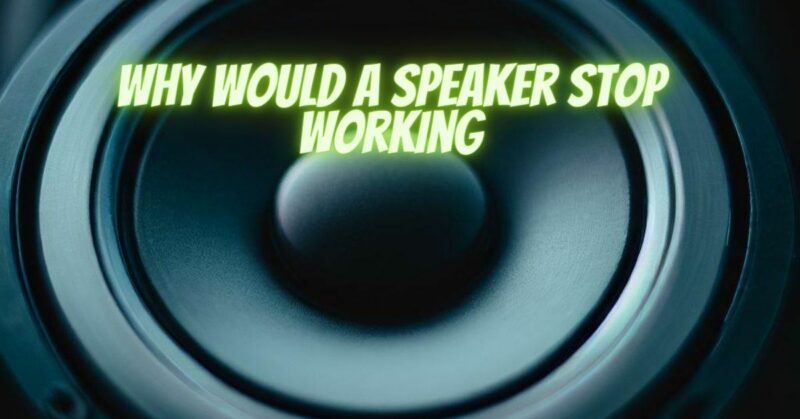Experiencing a sudden loss of sound from a speaker can be frustrating, especially when you’re in the midst of enjoying your favorite music or watching a movie. Understanding the potential reasons behind a speaker’s sudden failure can help you troubleshoot the issue more effectively. In this article, we will explore common factors that can cause a speaker to stop working and offer insights into possible solutions.
- Loose or Disconnected Cables: One of the most common reasons for a speaker to stop working is loose or disconnected cables. Check the connections between the speaker and the amplifier or audio source, ensuring that the cables are securely plugged into the correct ports. Verify that the connections are tight and free from any damage or corrosion that could affect the audio signal transmission.
- Amplifier or Receiver Issues: A malfunctioning or improperly set up amplifier or receiver can also cause a speaker to stop working. Check the amplifier or receiver settings to ensure that the correct speaker outputs are selected and that the volume levels are appropriately adjusted. Additionally, verify that the amplifier or receiver itself is functioning correctly by testing it with another set of speakers if possible.
- Blown Fuse or Circuit Breaker: A blown fuse or tripped circuit breaker can interrupt the power supply to the speaker, causing it to stop working. Check the speaker’s power source, such as the electrical outlet or power strip, to ensure that it is receiving power. Inspect the speaker for a blown fuse or a resettable circuit breaker, if applicable, and replace or reset them accordingly.
- Overheating or Thermal Protection: Speakers can sometimes stop working due to overheating. If a speaker is exposed to excessive power or used for an extended period without proper ventilation, it may activate its thermal protection mechanism, causing it to shut down temporarily. Allow the speaker to cool down, ensuring that it has adequate airflow, before using it again.
- Internal Component Failure: Internal component failure, such as a blown driver or a faulty crossover network, can lead to a speaker ceasing to work. If none of the above issues are apparent and the speaker remains unresponsive, it may be necessary to inspect the internal components. In such cases, seeking professional assistance or contacting the manufacturer for repairs or replacements may be required.
- Physical Damage or Speaker Defects: Physical damage, such as speaker cone tears, voice coil misalignment, or magnet displacement, can cause a speaker to stop functioning correctly. Similarly, manufacturing defects or age-related wear and tear can impact a speaker’s performance over time. If physical damage or defects are suspected, it is advisable to consult a professional for evaluation and possible repair.
Conclusion:
A speaker can stop working due to a variety of factors, including loose cables, amplifier issues, blown fuses, overheating, internal component failure, physical damage, or manufacturing defects. By systematically checking the connections, verifying the amplifier or receiver settings, inspecting the power source, and assessing for any visible damage, you can troubleshoot and potentially resolve the issue. If the problem persists, seeking professional assistance is recommended to diagnose and address more complex issues. Remember, proper maintenance, care, and regular inspections can help prevent many of these issues and prolong the lifespan of your speakers, ensuring an uninterrupted and enjoyable audio experience.


